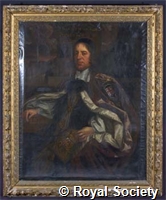| Authorised form of name | Ward; Seth (1617 - 1689); astronomer and bishop of Exeter and Salisbury |
| Other forms of surname | 'Seth Sarum' |
| Dates | 1617 - 1689 |
| Nationality | British |
| Place of birth | Buntingford, Hertfordshire, England, Europe |
| Date of birth | c. 1617 |
| Place of death | Knightsbridge, London, England, Europe |
| Date of death | 6 January 1689 |
| DatesAndPlaces | Baptism:
St Mary's Church, Aspenden, Hertfordshire, England, Europe (5 April 1617)
Burial:
Salisbury Cathedral, Wiltshire, England, Europe |
| Occupation | Clergyman, Church of England |
| Research field | Astronomy |
| Activity | Education:
Grammar School at Buntingford, Hertfordshire; Sidney Sussex College, Cambridge (BA 1637; MA 1640); Studied William Oughtred's mathematics with Charles Scarburgh (FRS 1663); Wadham College, Oxford (DD 1654)
Career:
Fellow of Sidney (1640-1644) ejected; ordained priest (1641); mathematical lecturer at Cambridge University (1643); imprisoned in St John's College, Cambridge as a Royalist (1644); Published 'Certain Disquisitions and Considerations Representing to the Conscience the Unlawfulness of the ... Solemn League and Covenant' (c.1643); Tutor to the sons of Ralph Freeman at Aspenden Hall (c1644-1649); Chaplain to Lord Wenman (1649); Savilian Professor of Astronomy, Oxford (1649-1661); Produced study of the nature of comets (1653); Collaborative work with John Wilkins (FRS 1663) on 'Vindiciae academiarum' (1654); Published 'Astronomia geometrica' (1656); Chaplain to Dr. Ralph Brownrig (1656); President of Trinity College, Oxford (1659-1660); Rector of Garsington, Oxford (1660) ejected; Canon and Precentor of Exeter (1660-1662); Rector of St Lawrence Jewry, London (1661-1662); Rector of Uplowman, Devon (1661); Rector of St Breock, Cornwall (1662); Dean of Exeter (1662); Bishop of Exeter (1662-1667); Bishop of Salisbury (1667-1689); Chancellor of the Order of the Garter (1671-1689); benefactor of the Royal Society and Sidney Sussex College; |
| Membership category | Original Fellow |
| Date of election | 20/05/1663 |
| RSActivity | Royal Society roles:
Council: 1664, 1666-1678 ; VP 1674-? |
| Relationships | Parents: John Ward and Martha Dalton |
| OtherInfo | Ward's works on planetary motion were able to refine Kepler's second law and simplify previous mathematicians' work on it. Ward's collaboration with Wilkins was considered a defence of English universities, and in other work Ward and Thomas Hobbes exchanged criticism of each other's position. Some of Ward's career choices are likely to have been influenced by the political and religious environment of his time; he refused translation to Durham in 1674 due to 'the conditions' there, although he offers no further elaboration. He frequently gave to charity, and funded scholarships at Christ's College, Cambridge. He additionally left money in his will to the parish of Aspenden, where he was baptised, and left money for a part of the upkeep of Salisbury Cathedral. He gained international interest as a mathematical astronomer while a Savilian professor, but he is often most remembered for his success as an ecclesiastical administrator. |
| Related images | Discover a selection of related images in our picture library |
| Image | 
|
| Source | Sources:
Bulloch's Roll; DNB; DSB; Venn; Foster; Aubrey; ODNB
References:
Hall, A R and Hall, M B. 1968. 'The Intellectual Origins of the Royal Society - London and Oxford', in Notes and Records, vol. 23, pp. 157-168
Helden, A van. 1968. 'Christopher Wren's De Corpore Saturni', in Notes and Records, vol. 23, pp. 213-229
McKie, D. 1960. 'The Origins and Foundation of the Royal Society of London', in Notes and Records, vol. 15, pp. 1-37
Ronan, C A. 1960. 'Laurence Rooke (1622-1662)', in Notes and Records, vol. 15, pp. 113-118
Turnbull, G H. 1953. 'Samuel Hartlib's Influence on the Early History of the Royal Society', in Notes and Records, vol. 10, pp. 101-130
Notes:
The election date is Ward's re-election date into the Society after the grant of the second charter in April 1663. All Fellows admitted in a two-month window after this charter, until 22 June 1663, are considered Original Fellows. He was previously admitted into the Society on 18 December 1661. |
| Virtual International Authority File | http://viaf.org/viaf/41998972 |
| Code | NA2442 |
| RefNo | Title | Date |
| IM/004792 | Ward, Seth | nd |
| DM/5/79E | 'Desired of my Lord Bishop of Exeter' | c.1660s |
| LBO/4/63 | Copy letter from Edward Cotton, Exeter, to Seth Ward, Lord Bishop of Sarum | 7 January 1671 |
| MS/390/24 | Bond of Seth Ward to the Treasurer of the Royal Society | 26 November 1674 |
| NLB/66/331 | Copy letter from Francis Alexander Towle, Assistant Secretary of the Royal Society; to Richard Pilcher Esq., Registrar and Secretary, Institute of Chemistry of Great Britain, Russell Square, W.C | 10 April 1924 |
| DM/5/101 | A list of benefactors to the Museum, to the value of £5 or upwards at one time | c.1737 |
| IM/005106 | Ward, Seth | December 2004 |
| DM/5/70 | Resolution signed by Henry Oldenburg, appointing a Committee of the Royal Society to consider a way of determining the measure of a degree on the earth | 21 October 1669 |
| EL/C1/30 | Letter, from Edward Cotton to the Bishop of Sarum [Seth Ward], dated at Exeter | 7 January 1670 |
| EL/C1/29 | Letter, from Edward Cotton to Seth Ward, dated at Silferton | 6 February 1667 |
| EL/C1/4 | Letter, from Joshua Childrey to the Bishop of Salisbury [Seth Ward], dated at Upway | 31 March 1669 |
| EL/B1/62 | Letter, from John Beale to Bishop Seth of Sarum [Seth Ward] | 1670s |
| P/0220 | Portrait of Seth Ward | 1673-1674 |